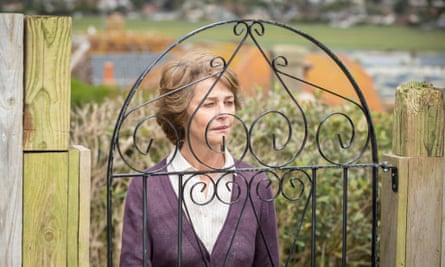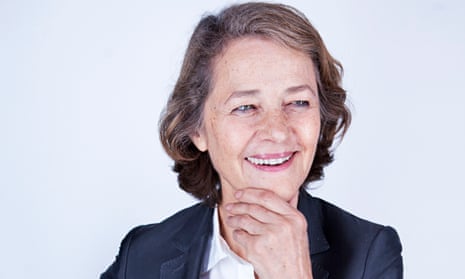Very shortly, you’ll be appearing in Manchester in Neck of the Woods, a theatrical collaboration between Turner prize winner Douglas Gordon, pianist Hélène Grimaud, writer Veronica Gonzalez Peña and you. It’s about wolves, isn’t it?
Yes, I will be the narrator, the interpreter, the person who will actually lead you through the story. There is a fundamental theme, which is the mysteriousness of the wolf, the bad reputation of the wolf, the mythology and the wolf in psychoanalytical terms.
Wolves seem to have come back to the fore recently, especially with an interest in rewilding. Why do you think they continue to fascinate?
There’s something about the wolf, I guess, because since childhood and fairy stories we have had this idea of this ultimate predator, just waiting to pounce on us, waiting to come in. It’s always as if he’s hovering, this wolf, and going to get us one day.
When we first talked, Douglas said: “I’m going to begin with a fairy story, the fairy story of all time, which is Little Red Riding Hood.” And as we get into the woods, it starts to open up into other areas, when the narrator begins to understand what it actually means and gets very frightened about what it represents.
I understand it’s been a very collaborative process?
What’s fabulous about these shows is that we’ve all been busy, busy, busy doing other things, so we got together every now and again; then you just feed in and the wonderful thing about live performance is you come up with something that rather surprises everybody, whether it works or not – we hope it does!
It sounds exciting, but perhaps a little daunting?
You can’t fool an audience. You can’t just give them lots of bits and pieces. You have to lead an audience somewhere. If an audience decides to take the performance off somewhere else, you’ll have a few people – it’s quite interesting how it happens, almost like an agitator – that will just take the play away from the players. And they’ll laugh at the wrong time, they’ll kick up, they’ll cough a lot, they’ll be agitated, you can feel that you’ve lost them. And that’s absolutely no good for anybody.
Your work in theatre is a relatively late addition to your career and includes performances of Sylvia Plath’s poetry. How important has this new, live strand been?
It’s taken me to other places, which I guess I was seeking and not really knowing it. Quite often, I don’t quite know what I want to do, and then something will come up that could give me a channel into another world, into another way of performing, another way of doing. It’s a question of what you need to stimulate you – I need quite unusual things to stimulate me.

Most recently, we’ve seen you on television in the second series of Broadchurch, where you played the prosecution barrister Jocelyn Knight. Was it fun?
Yes, I’d never done a series of that length, except for the American series Dexter, two years before – a very different story. So that was very exciting because I hadn’t done it before. I like the way of working on a series, when you come in and out all the time, you don’t know what your story is going to be, you’re living in real time when you get the script for each episode. You don’t know what you’re going to be doing.
So the plot was developing throughout?
Completely. Chris Chibnall was writing as we went along.
You didn’t know whether you were going to win or lose the case?
Yes – the only things I did know were about my character. That she had an eye problem and was going blind, that she was living as a recluse at the beginning. So just a few pointers – because you have to have a character slightly described to you. But that was all.
It must have had a huge impact on the cast when they realised someone of your acting pedigree and reputation would be joining them.
I honestly don’t know, because you don’t think of yourself like that. I’m always very thrilled and flattered when I hear somebody like yourself saying that. But unless you’re a rather strange sort of egocentric maniac, you don’t really think that yourself.
The thing about English actors that sets them apart from actors in other countries is that they really are generous. They really are good working actors, everybody, whether you’re the star of the piece or whether you’ve just got a few lines. Everyone is treated the same, you’re all a travelling group together, you all respect your work.
You’ve also made a film, 45 Years, with Tom Courtenay [for which they won joint acting honours at the Berlin film festival this year], and a television series called London Spy. You’re extremely busy, aren’t you?
One of the reasons is that when you get older, obviously your face looks older, and your body may be a bit creaky, but if you’re in good health, you do not feel old. Everyone says this – you still have the mind of a young woman. But you know that your time is counted. And your face is counted too. So you say to yourself, in your mid-60s, how much time am I going to have? Do I want to slow down or do I want to make sure that I’m still connecting with the world?
It keeps you feeling that you are part of the world that is pushing on, not the world that’s going over the hill. A lot of it is to do with that, probably unconsciously.
You’ve been called iconic on many occasions and you’ve said in the past that one shouldn’t get involved with one’s image. But how difficult is it to do that?
Quite early on, when I saw my image in one of the first few films, I saw somebody that I did not know, and I thought: oh my God, who the fuck is this? And I knew that inside myself, I wasn’t that person, but I said, if I can play it, and if I can make believe I am, if I’m able to be that person there on the screen that I’m seeing, then maybe I’ve got a chance.
It sounds like you separated a part of yourself?
Yeah, it was an extreme form. Which is why people say I’m very distant, I’m cold, I hold space between me and other people; I suppose that’s what I developed, as a protection.
And yet you’re not at all like that to talk to – we’re laughing and joking!
Yes! I did think when I read an article about myself the other day, do people honestly think that one is inside this distant ball, with this rather fierce attitude? And that you could be somebody who actually doesn’t laugh? Have all these years gone by and people are still saying that?
Neck of the Woods runs at Manchester international festival from 10 July; mif.co.uk

Comments (…)
Sign in or create your Guardian account to join the discussion